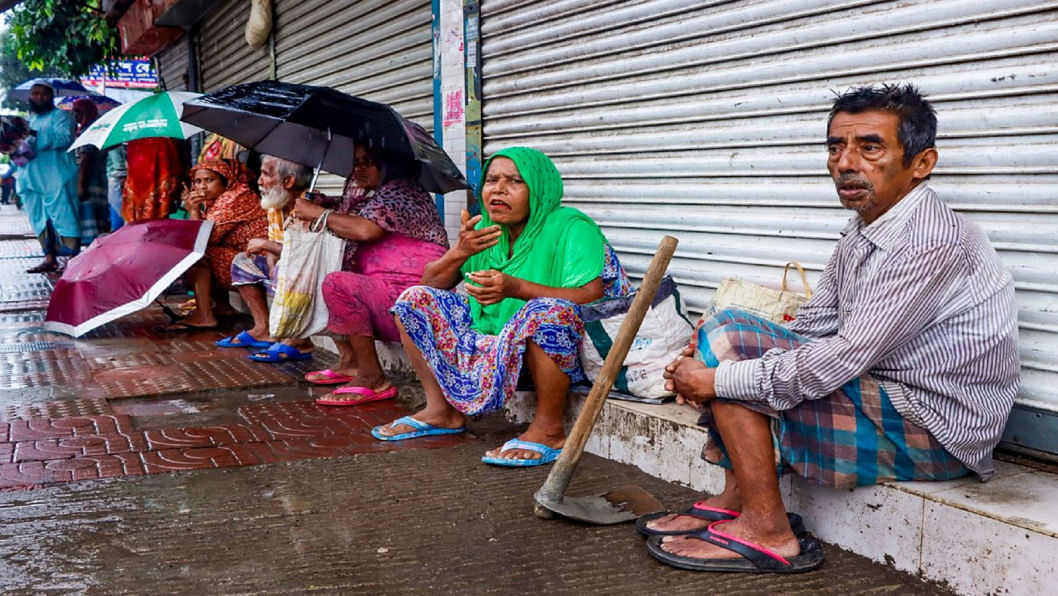Real wage growth remains negative for 41 months

Bangladesh's average wage growth remained negative for the 41st consecutive month in June, even as the inflation rate eased to its lowest level in nearly three years, according to the latest data from the Bangladesh Bureau of Statistics (BBS).
Year-on-year, wage growth stood at 8.18 percent in June—0.30 percentage points below the month's inflation rate of 8.48 percent, as per the recently released BBS Wage Rate Index (WRI).
A similar trend was observed in May, when wages across 63 occupations in the agriculture, industry, and services sectors grew by 8.21 percent, 0.84 percentage points below inflation at the time.
Division-wise, wage growth rose only in Rangpur, while it declined in all other divisions.
The continued decline has forced many to cut back on consumption as their real incomes shrink, with economists warning that if nothing changes, millions might fall victim to malnutrition.
"The persisting outpacing gap has been pushing low- and limited-income groups to the brink for years," said Mohammad Lutfor Rahman, a professor in the Department of Economics at Jahangirnagar University.
A report released earlier this year by the Food and Agriculture Organization of the United Nations (FAO) on Bangladesh supports the assertion.
The FAO said the number of people in Bangladesh facing high levels of acute food insecurity increased by 70 lakh to 2.36 crore in December last year, compared to 1.65 crore during the April-October period of 2024.
Prof Rahman attributes part of the stagnation in wage growth to Bangladesh Bank's contractionary monetary policy, which, while successful in controlling inflation, has increased borrowing costs, discouraging large investment.
"While inflation control is a positive outcome, without coordinated efforts to reduce interest rates and boost employment, the economic recovery remains uneven and exclusionary," noted the economist.
The central bank raised the policy rate to 10 percent in October 2024, the 11th hike since May 2022, in a bid to tame inflation by making borrowing more expensive.
"At current lending rates, very few entrepreneurs are willing to take the risk of borrowing to invest, especially in sectors that generate large-scale employment," Rahman said.
With no corresponding increase in labour demand, a growing surplus in the workforce is suppressing wage growth, even as inflation softens, he added.
"Concerns are growing that many lower- and middle-income households are unable to meet basic dietary needs, raising long-term health and productivity risks," the JU professor noted.
Echoing the same, Mustafa K Mujeri, executive director of the Institute for Inclusive Finance and Development (InM), said despite easing inflation, the continued decline in wage growth means workers are effectively earning less in real terms.
"Their purchasing power has eroded significantly, limiting their ability to afford basic necessities," he said, adding that this is raising serious concerns about malnutrition, particularly among women and children, whose dietary needs are often deprioritised during household budget cuts.
The price of staple foods like rice remains high despite a good harvest season, which is making things harder for low-wage earners. "For low-income families, who spend a large portion of their earnings on food, this is devastating."
According to Mujeri, the persistent gap in wage growth and product prices has now become a structural problem. "Without intervention, it threatens to widen income inequality and push more people into poverty."
The government must urgently focus on employment generation to absorb the growing labour surplus and lift wages to resolve the situation.
"If real incomes continue to fall and nutritional deficits widen, Bangladesh risks facing a generational health crisis, undermining long-term workforce productivity and economic resilience," he warned.
Meanwhile, Shaifuddin Khaled, a lecturer in the Department of Economics at Begum Rokeya University, Rangpur (BRUR), said the government should strengthen its support for workers by developing a comprehensive database to facilitate minimum wage enforcement and social protection.
"Despite nearly 85 percent of the labour force being engaged in the informal economy, the government still lacks a proper database to identify and support them, especially during periods of inflationary pressure," he pointed out.
"Without urgent protective measures, we risk pushing millions further into nutritional poverty. And this isn't just a public health issue, it's a matter of intergenerational equity," he said.

 For all latest news, follow The Daily Star's Google News channel.
For all latest news, follow The Daily Star's Google News channel. 



Comments